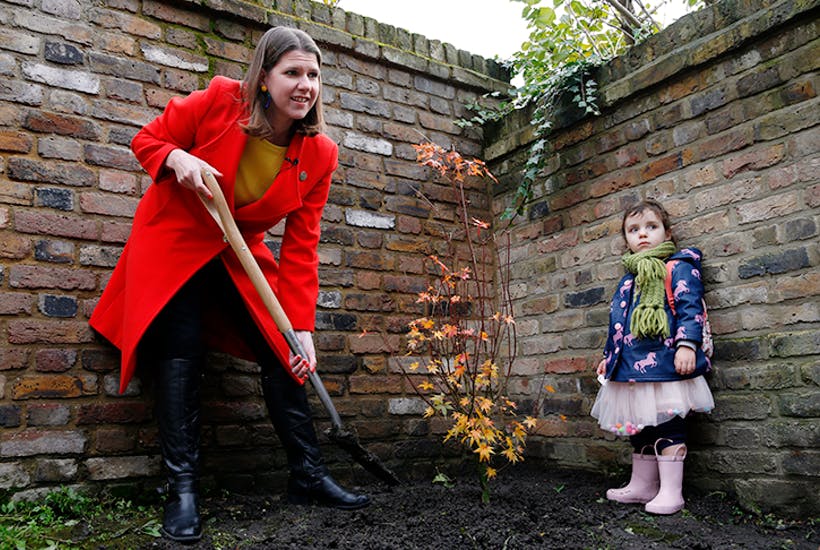‘Four beef burgers is the same as flying to New York and back! FOUR BURGERS!’ When I arrived at the Extinction Rebellion demo, the first person I met was a woman activist, clad from head to foot in ocean-polluting, synthetic fibres, talking absolute nonsense.
And because I’m a beef farmer, I felt I should set her straight. I explained that no, my grass-fed beef does not harm the planet, and asked her what on earth she expected the farmers of Britain to do if they couldn’t keep cows. ‘Ah,’ she says, folding her arms, ‘they should just grow trees.’
Trees are fast becoming the answer to everything. Worried about floods? Don’t bother dredging rivers, just plant forests. Anxious about the effect on the environment of flying? Get your PR to tweet about all the trees you have planted on your Hampshire estate. Want to spend Christmas at Chequers? Make sure your party manifesto commits to more trees, and not just of the magic money variety.

It’s now compulsory for politicians to be keen on trees. The prize for the most ludicrous tree-planting photo opportunity goes to Jo Swinson, dressed like a ketchup bottle, standing as far away from the tree as she can. The biggest virtue-signaller is without doubt Jeremy Corbyn, who has pledged that a Labour government will plant two billion — yes, billion — new trees by 2040. Never mind that these would need an area half the size of Wales to be planted at commercial densities, or the whole of Wales if they are to be grown in line with his other commitment to ‘wilding’.
But the trouble is, tree planting just isn’t a catch-all solution to climate change. I think I can credibly claim to be a carbon-neutral farmer. As well as rearing beef cattle I grow trees — in fact I have probably planted more of them than jet-setters Emma Thompson and Chris Packham combined — but even I think a dose of scepticism is required.
Some lazy assumptions are made by tree enthusiasts that need to be challenged. The first is simply a result of short-sightedness. How can we be sure when we plant a tree on grazing land in this country that we are not just causing a better tree to be cut down in the Amazon basin? We need protein in our diets, and if we’re not getting it from meat it’s likely we’re relying on soya, grown in Brazil on land that’s been deforested. Swapping biodiverse primary rainforest for dark, bird-less conifer plantations on Scottish hillsides is a rubbish deal for the planet — since ‘the planet’ is what we are all supposed to be concerned about.
Airlines trade carbon credits in the same way that medieval sinners once bought indulgences from the Church
The second lazy assumption comes from a counter-enlightenment approach to the science. ‘Climate emergency’ panic has taken over from scientific rigour and empiricism. Wild and nonsensical myths of the ‘four burgers’ variety spread unchecked, which makes tree-planting a very lucrative side-line. Airlines trade their carbon credits with forestry companies in the same unthinking way that medieval sinners once bought indulgences from the Church. This summer Sir Elton John excused the air miles notched up in his private jet by the Duke and Duchess of Sussex (while campaigning for action on climate change) by ‘making the appropriate contribution to a carbon-offset scheme’. But what no one asks is whether the trees being planted under these schemes would have been planted anyhow, and no one stops to check whether they really make flights ‘carbon neutral’, because what matters is not actually caring about the planet, but appearing to one’s friends as if one does.
The truth is that the benefits of planting trees are often exaggerated and seldom weighed against the carbon costs of a new plantation. Any realistic carbon calculation would have to consider the ploughing before planting. Nor are new plantations netted against what was growing here before, which might already have been very efficacious carbon sinks — either efficiently grazed permanent pasture or peaty moorland that has been burnt regularly to renew the sphagnum moss and heather.
The trees vs farmland argument has recently been thrown into doubt by new science from the University of Helsinki showing that pines, birches and spruces actually increase nitrous oxide in the atmosphere. And from a global team of Intergovernmental Panel on Climate Change researchers based at Oxford, showing categorically that methane from Britain’s ruminants is not causing further global warming as long as their number doesn’t increase because, unlike other greenhouse gases, methane doesn’t stay in the atmosphere for ever.
The third assumption comes from a metropolitan ignorance of the countryside. We think we are returning the land to primordial forest but the closed canopy forest we are creating now almost certainly never existed. Every time new forestry is planted on our heather hills, we swap the uniquely British biodiverse habitat of iconic birds such as curlews and hen harriers — and yes, red and black grouse — for monocultures of alien species like the sitka spruce from the North Pacific islands. This remains true even for the new planting schemes that require token margins of native trees. Our most at-risk bird, the curlew, will not nest within 500 metres of the forest edge because of predators such as crows, buzzards and badgers, so it is being further endangered by the loss of swaths of its moorland habitat. And one theory for the alarming decline in salmon numbers is runoff from conifer forestry acidifying our rivers. Overseas conservationists who marvel at our unique upland landscapes — 75 per cent of the world’s heather moorlands — must think we are bonkers. Maybe we would be better to celebrate what we already have and look at ways to improve our moorland and grassland’s already impressive capacity to lock up carbon and retain water instead of taking the easy option.
Trees are beneficial but we shouldn’t kid ourselves that they are the panacea that some of our politicians would have us believe. We should be careful what we wish for. Environmentalists always bemoan the lack of forest cover in this country when compared with the Continent. But have you ever been to Poland?
Jamie Blackett is a beef farmer in Dumfries and the author of Red Rag to a Bull: Rural Life in an Urban Age.






Comments